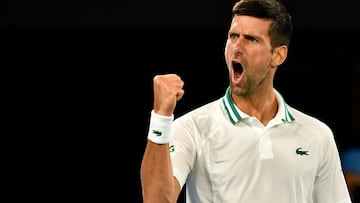Djokovic wins trial: could he be deported by the Australian Government?
Novak Djokovic has won his appeal against the Australian government's decision to refuse him a visa ahead of the season's first grand slam but what next?

Novak Djokovic, the world number one men's tennis player, has won his appeal against the Australian government's decision to cancel his visa. But there are suggestions that they could still block the player's entry into the country.
Djokovic wins appeal, but could still lose visa
Djokovic, who did not reveal his covid-19 vaccination status, seemed set to compete in the Australian Open under a medical exemption. Yet he was then placed in an immigration detention hotel awaiting a hearing on Monday, after Australian border forces refused to allow him entry.
BREAKING | The judge has quashed the cancellation of Novak Djokovic's visa
— AS USA (@English_AS) January 10, 2022
Djokovic must be released from immigration detention immediately and will now be allowed to stay in Australia having his passport returned pic.twitter.com/cE1NktxdRQ
Court papers filed by Djokovic's representatives on Saturday stated that the 34-year-old had been given the medical exemption after testing positive for covid-19 on 16 December.
The Serbian's lawyers also claimed they had an assessment from the Australian Department of Home Affairs which stated that his responses on his Traveller Declaration form met the requirements for quarantine-free travel into Australia, whose government responded by filing court papers of its own on Sunday.
The 13-page document not only challenged the claim that Djokovic had covid-19 last month, but also indicated the government would still refuse the nine-time Australian Open champion entry into the nation even if the hearing was decided in the player's favour.
The document claimed the government "had not represented to the applicant that his so-called 'medical exemption' would be accepted."
Welcome to Behind the Scenes at Melbourne Park with your host @GrigorDimitrov 💯#AusOpen • #AO2022 pic.twitter.com/t63yg9zeFj
— #AusOpen (@AustralianOpen) January 9, 2022
Australia's government also argued that: "There is no suggestion that the applicant had 'acute major medical illness' in December 2021. All he has said is that he tested positive for covid-19.
"That is not the same. Thus the ATAGI Vaccination Advice uses different terms, such as mere "past infection" and also "symptomatic infection"."
The document goes on to conclude that, should the hearing be ruled in Djokovic's favour, it must be expressly stated that he could not be re-detained or have his visa cancelled once again.
"If this Court were to make orders in the applicant's [Djokovic] favour, it would then be for the respondent [Australian government] to administer the Act in accordance with law.
"That may involve the delegate deciding whether to make another cancellation decision, but there are also other powers in the Act, as the Court would be aware. Or, indeed, no power may be exercised.

"It is sufficient for the Court to quash the decision. From the time those orders are made, the respondent will act on the basis that the applicant's visa has not been cancelled.
Related stories
"If the Court makes an additional orders for immediate release of the applicant, notwithstanding the above, the respondent submits that the Court should make it expressly clear that that order does not purport to (nor could it) prevent the respondent or any officer of the Commonwealth from exercising any power to detain that might be available to him or her despite the quashing of the delegate's cancellation decision.
"An order for immediate release does not prevent re-detention if there is power to detain."

